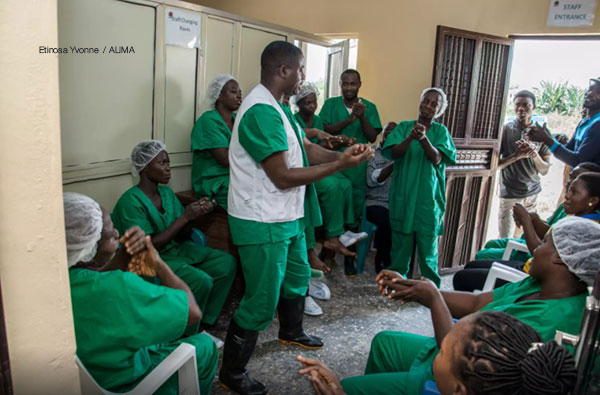On 26 December 2013, two-year-old Emile fell ill in a remote village in rural Guinea. His illness was characterised by a high fever, diarrhoea and vomiting, and he died just two days later. His pregnant mother Sia, three-year-old sister Philomène, and grandmother Koumba, also fell ill and died shortly after.
The disease that killed Emile and his family subsequently spread across villages, towns and borders. An international response became necessary and in June 2014, just two months after its inception, the Start Fund was among the first to respond to this outbreak in Sierra Leone, to where it had spread.
The outbreak, which at that point had recorded some 700 cases, would go on to become the most widespread epidemic of the Ebola virus in history. It was responsible for the death of over 11,000 people and took two years to be fully controlled. What started with one toddler went on to cause major loss of life and socioeconomic disruption and affect tens of thousands of people, many of whom suffer to this day with post-Ebola syndrome.
Ebola outbreaks, unknown in West Africa at that time, had previously been contained in a matter of weeks in other countries, but a combination of extreme poverty, population movements in built-up areas, dysfunctional healthcare systems, and delays of several months in international response all contributed to the failure of controlling this epidemic.
The West African Ebola virus epidemic was not a one-off. From the Zika virus in the Americas to Middle Eastern Respiratory syndrome (MERS), data has shown that dangerous disease outbreaks are proliferating across the globe and the number of new diseases per decade has increased almost four times over the past 60 years. Since 1980, the number of rapid infectious disease outbreaks per year has more than tripled and the young and elderly are particularly vulnerable.
If we are to learn anything from Emile’s death, it is that disease outbreaks in developing countries must be treated seriously and responded to in a timely manner to avoid their spread. This is even more crucial when the situation is exacerbated by conflict, drought or flooding, all of which can displace populations, affect access to safe water and sanitation facilities and limit the availability of healthcare services.
Since 2014, the Start Fund has aimed to reduce the consequences of these outbreaks by providing funding to the agencies best placed to respond. To date, the Fund has responded to 21 outbreaks (including one anticipated outbreak) across 14 countries. In doing so, the Fund has learnt a lot about responding to communicable diseases in humanitarian emergencies and commissioned a learning review to highlight and facilitate the sharing of this information.
The Start Fund: Learning from Disease Outbreaks review attempts to understand the drivers and barriers in implementing effective disease outbreak response, as well as to understand the varying experiences of Start Network members in delivering these programmes.
We hope that by analysing the effectiveness, efficiency and relevance of Start funded disease outbreak responses, we can support evidence-based decision-making within the Start Network and ensure that assistance is rapidly provided to the people that require it most and prevent more stories like Emile’s from happening.
The Start Fund is a multi-donor pooled rapid response fund that initiates disbursement of humanitarian finance within 72 hours. It is collectively owned and managed by the Start Network members, a group of 42 national and international aid agencies from five continents.

